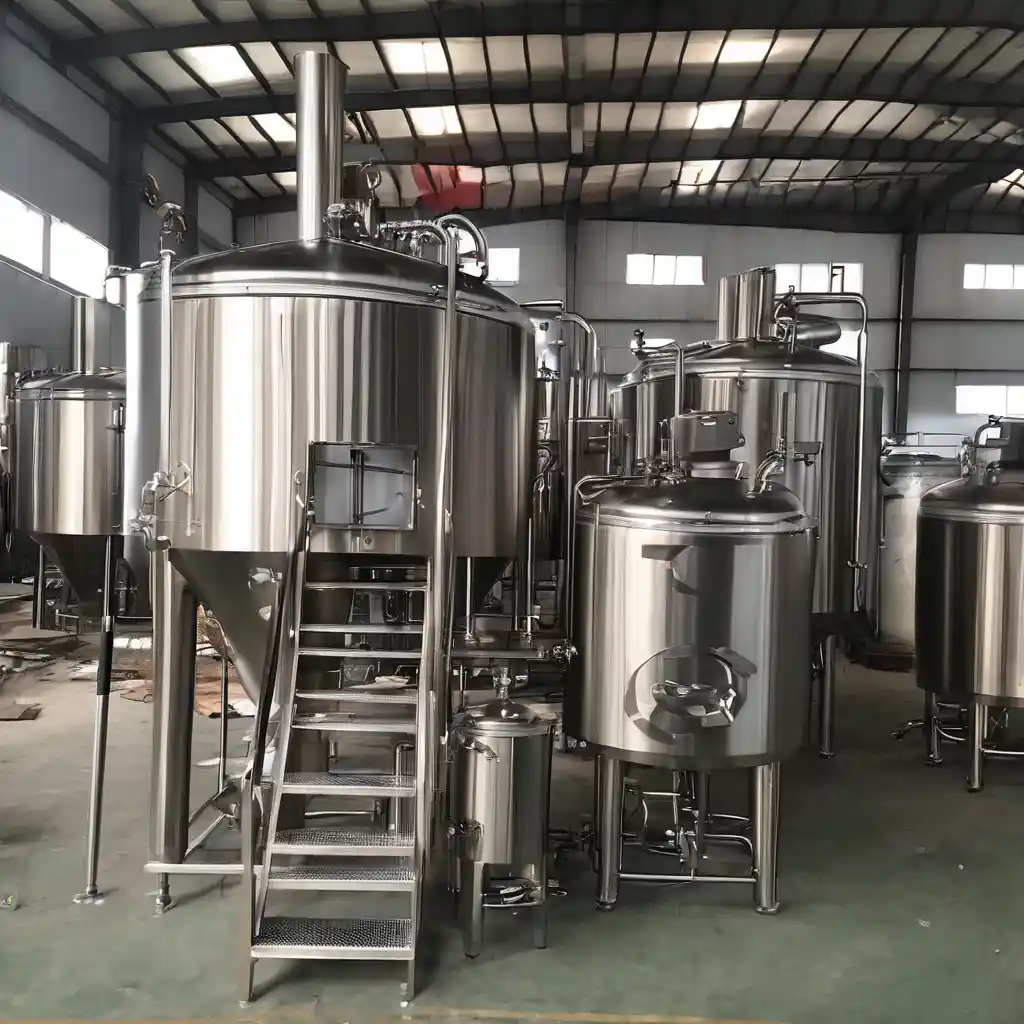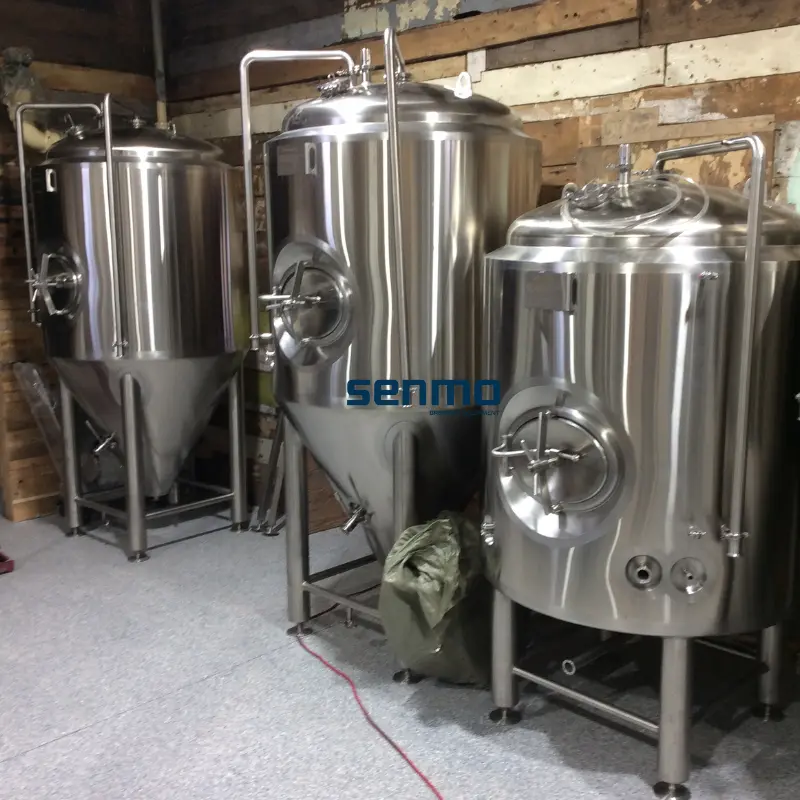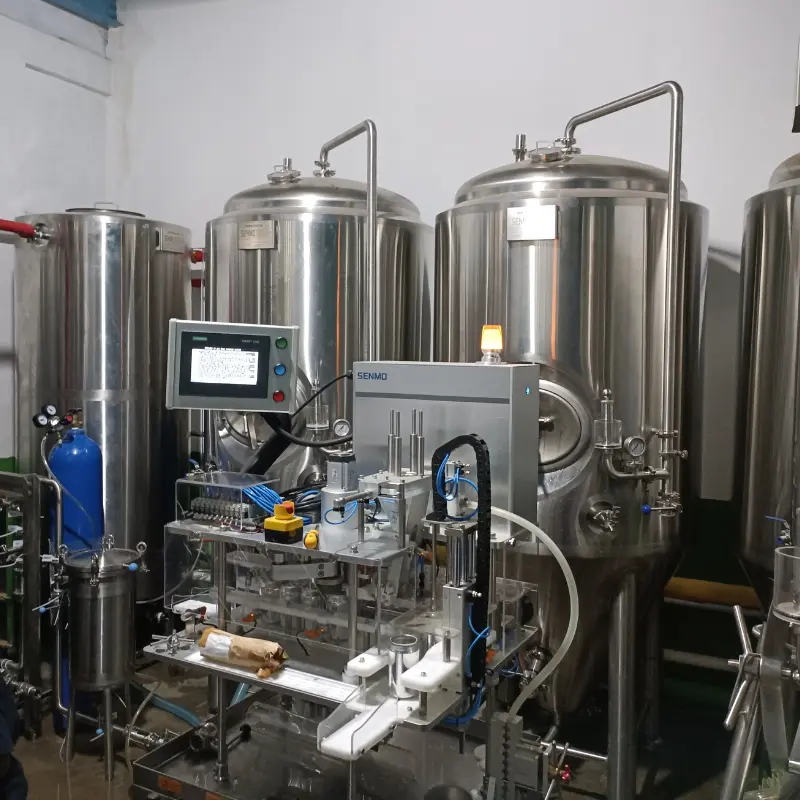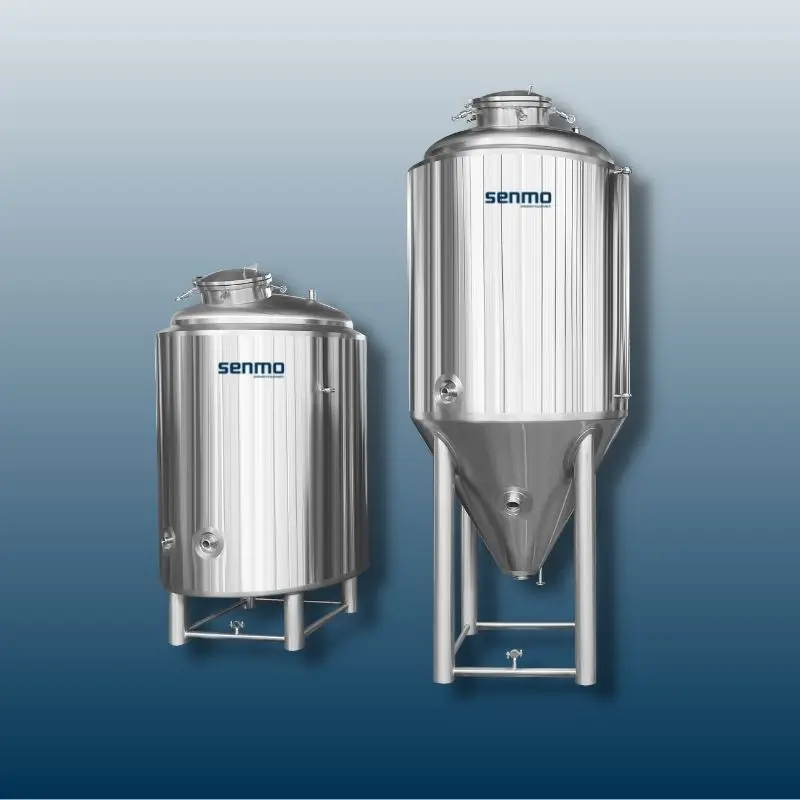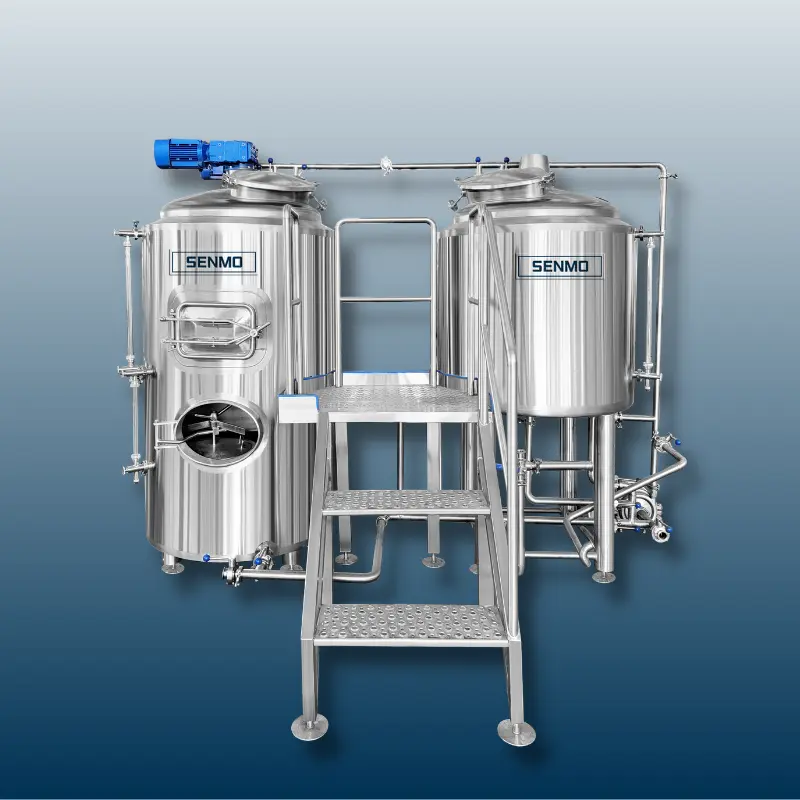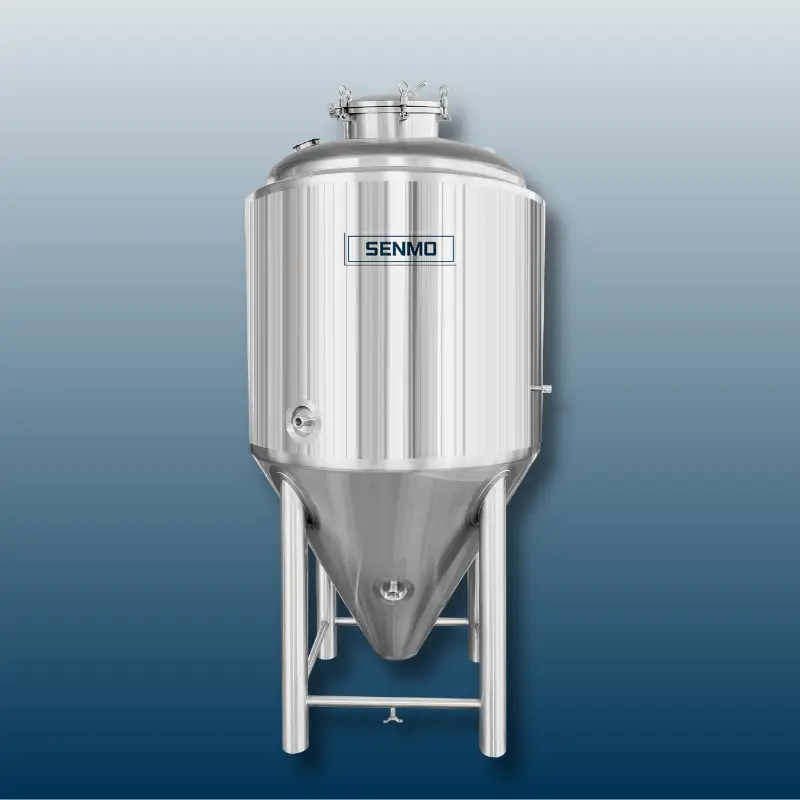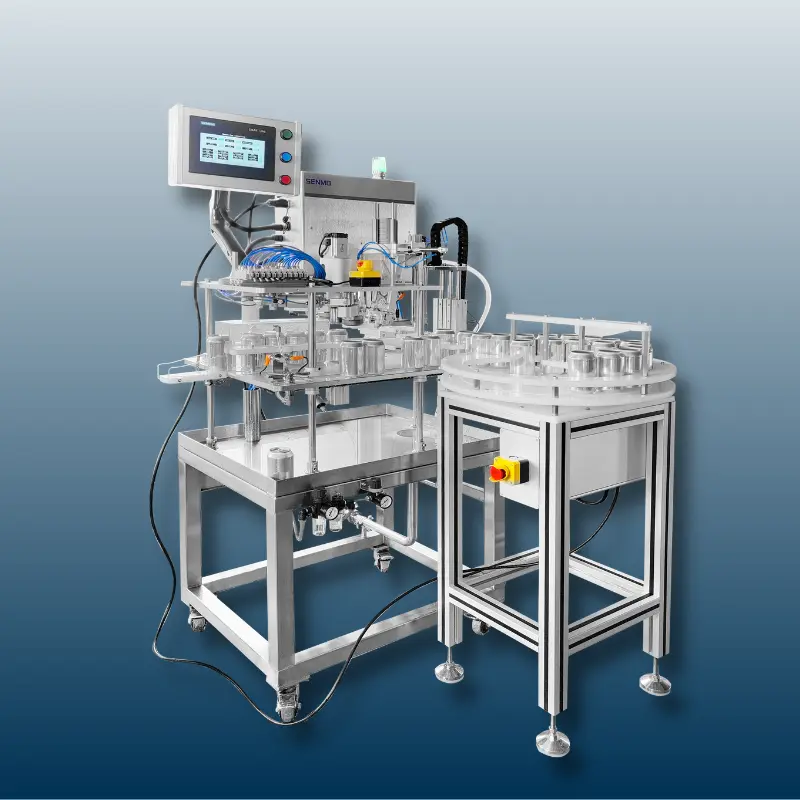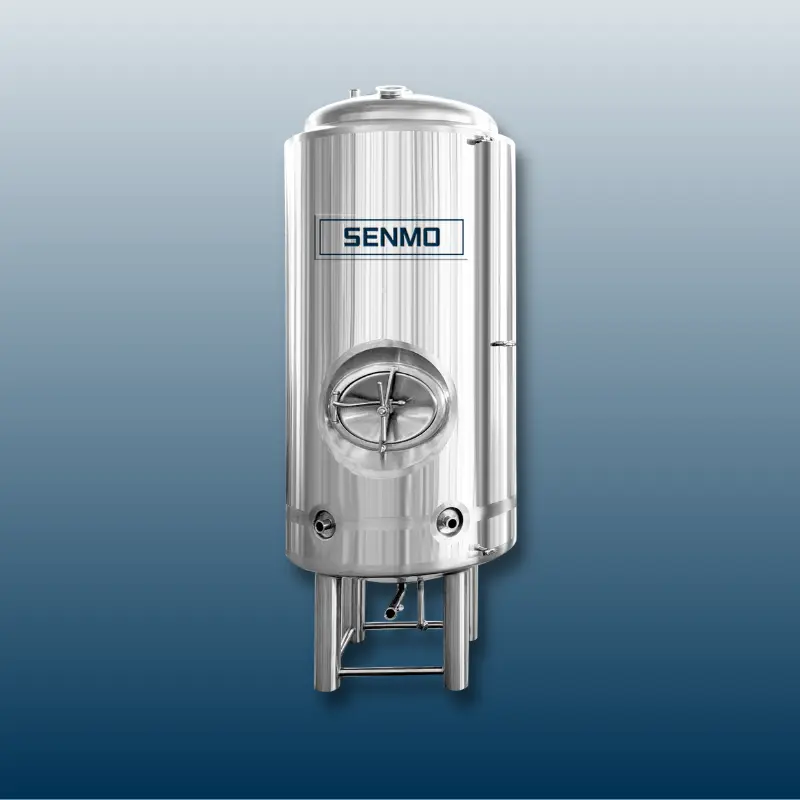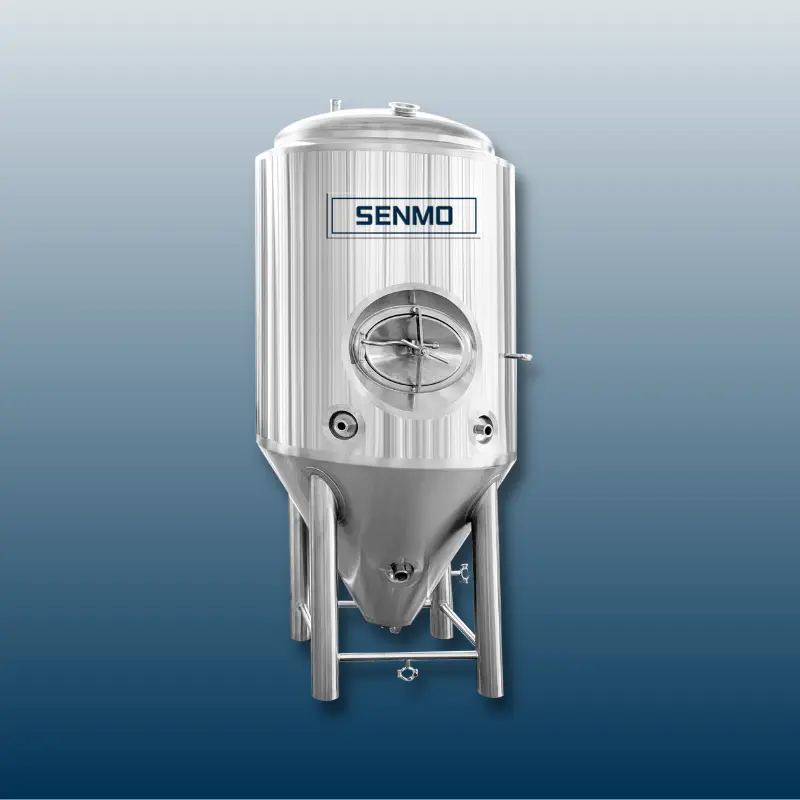The craft beer revolution has transformed the beverage industry, with microbreweries leading the charge by offering distinctive and high-quality beers. For aspiring brewers, setting up a successful microbrewery hinges on selecting the right equipment. Investing in top-notch microbrewery equipment ensures not only efficient operations but also consistent and high-quality beer production. As a leading manufacturer and exporter of microbrewery equipment, SENMO is dedicated to supporting small-scale breweries worldwide with the tools they need to succeed.
1. Brewhouse System: The Core of Brewing
The brewhouse system is the cornerstone of any microbrewery, serving as the initial stage where raw ingredients are transformed into wort—the precursor to beer. This critical equipment typically includes four main components: the mash tun, lauter tun, kettle, and whirlpool. Each plays a unique role in the brewing process and contributes to the final product's quality.
Mash Tun
The mash tun is where the grains are mixed with hot water to create a mash. This process converts the starches in the grains into fermentable sugars. The temperature and duration of mashing are crucial, as they influence the beer's flavor, body, and mouthfeel. A well-designed mash tun allows for precise temperature control and efficient mixing, which is essential for achieving consistent results.
Example: A 7BBL (barrel) mash tun, like those offered by SENMO, is ideal for small-scale breweries. It allows brewers to manage the mashing process with a balance between batch size and flexibility, accommodating different grain types and recipes.
Lauter Tun
After mashing, the mash is transferred to the lauter tun, where the wort is separated from the spent grains. This process involves draining the liquid wort and sparging, or rinsing, the grains to extract as much sugar as possible. Effective lautering is critical for maximizing efficiency and ensuring that the wort has the desired sugar content for fermentation.
Example: The lauter tun should be equipped with a false bottom or slotted plate to facilitate efficient wort separation. SENMO’s lauter tuns are designed to handle various grain bills and sparging techniques, optimizing wort extraction and minimizing waste.
Kettle
The kettle is where the wort is boiled, and hops are added for flavor, bitterness, and aroma. Boiling also sterilizes the wort, removing unwanted microorganisms. The kettle should be capable of maintaining a rolling boil and evenly distributing heat to prevent scorching or uneven cooking.
Example: In a 7BBL brewhouse, the kettle must handle the full volume of wort while ensuring consistent heating. SENMO’s kettles are engineered for efficiency, featuring advanced heating elements and insulation to maintain precise boiling temperatures and energy efficiency.
Whirlpool
After boiling, the wort is transferred to the whirlpool, where it is rapidly spun to separate the hop residue and other solids from the clear wort. This step is crucial for achieving a clean, clarified wort that will ferment properly.
Example: A whirlpool with an effective spinning mechanism and integrated cooling system, such as those provided by SENMO, helps speed up the cooling process while improving wort clarity and quality. This equipment minimizes the risk of unwanted flavors and ensures a smooth transition to fermentation.
Choosing the Right Brewhouse Size
For small-scale breweries, brewhouse sizes typically range from 3 to 15 barrels (BBL). A 7BBL system is particularly popular because it offers a good balance between capacity and flexibility. This size allows breweries to produce up to 1,000 barrels of beer annually, accommodating diverse beer styles and batch sizes.
Benefits of a 7BBL System:
Flexibility: The 7BBL brewhouse can handle a variety of recipes and batch sizes, making it ideal for breweries that want to experiment with different styles or scale their production.
Efficiency: This size is manageable for small teams and allows for efficient use of resources, including ingredients and energy.
Growth Potential: As the brewery grows, a 7BBL system provides room for expansion without requiring an immediate overhaul of equipment.
Advanced Control Systems
Investing in a high-efficiency brewhouse with advanced control systems is crucial for maintaining precision and consistency. Modern brewhouses, such as those provided by SENMO, come with features like automated temperature control, programmable brewing schedules, and real-time monitoring.
Advantages of Advanced Control Systems:
Precision: Automated systems ensure accurate temperature management and timing, which are critical for producing consistent beer.
Repeatability: Programmable settings allow brewers to replicate successful recipes with minimal variation, enhancing product consistency.
Efficiency: Real-time monitoring helps identify and address potential issues promptly, reducing downtime and optimizing the brewing process.
In summary, the brewhouse system is the heart of any microbrewery, and selecting the right equipment is essential for successful brewing. A 7BBL brewhouse offers a versatile and efficient solution for small-scale breweries, while advanced control systems from SENMO enhance precision and consistency. By investing in high-quality brewhouse equipment, breweries can achieve their brewing goals and deliver exceptional products to the market.
2. Fermentation Vessels: Shaping the Beer
Fermentation vessels, often referred to as fermenters, are critical in the beer-making process. They are where the wort, the liquid extracted from mashed grains, transforms into beer through fermentation. This process involves yeast converting sugars into alcohol and carbon dioxide, which creates the beer's unique flavors, aromas, and carbonation. The design and functionality of these vessels significantly influence the final product's quality and consistency.
Function and Importance
Fermentation vessels serve several key functions:
Fermentation: This is where yeast performs its work, fermenting the sugars in the wort into alcohol and producing carbonation.
Conditioning: Some fermenters are used for additional maturation or conditioning of the beer after the initial fermentation phase.
Carbonation: During fermentation, carbon dioxide is produced, which contributes to the beer's carbonation level.
Size and Capacity
The size of fermentation vessels is crucial for aligning with the brewhouse capacity and meeting production goals. For small-scale breweries, it's common to start with fermenters that match the brewhouse size, ensuring that each batch can be processed efficiently.
Example: A 10BBL (barrel) fermenter can handle approximately 310 gallons of beer per batch. This size is well-suited for breweries that produce moderate volumes and want the flexibility to scale production as needed. The vessel's capacity allows for sufficient volume to meet demand while also accommodating variations in recipes and styles.
Key Features of Fermentation Vessels
To ensure optimal fermentation and product consistency, several features are essential:
Temperature Control: Precise temperature management is critical for fermentation. Different yeast strains require specific temperatures to ferment effectively and produce desired flavors. Temperature fluctuations can lead to off-flavors or inconsistent results. Advanced fermentation vessels, such as those from SENMO, are equipped with integrated temperature control systems, including cooling jackets and thermostats, to maintain stable conditions throughout the fermentation process.
Sanitation: Proper sanitation is crucial to prevent contamination and ensure the quality of the beer. Fermenters should have smooth, easy-to-clean surfaces and access points for cleaning and sanitizing. SENMO’s fermenters are designed with high-quality materials and easy-access ports to simplify cleaning and maintenance.
Pressure Management: Depending on the beer style, fermentation can occur under varying pressures. Some beers, like lagers, benefit from fermentation under pressure to reduce ester and phenol production. Fermenters with built-in pressure relief valves, like those from SENMO, allow brewers to manage this aspect of fermentation effectively.
Sampling and Testing Ports: To monitor fermentation progress, fermenters should include sampling ports for taking gravity readings and sensory tests. SENMO’s fermenters come with convenient sampling ports that make it easy to track fermentation and ensure the beer is developing as expected.
Yeast Management: Managing yeast is crucial for a successful fermentation. Fermenters with features such as yeast rakes or cones at the bottom facilitate yeast harvesting and collection. SENMO’s designs include efficient yeast management features, helping brewers maintain healthy yeast populations and manage yeast pitches for future batches.
Case Study: Optimizing Fermentation with SENMO
Consider a small brewery that began with a single 5BBL brewhouse and a few 5BBL fermenters. As their production increased, they upgraded to a 10BBL brewhouse and added several 10BBL fermenters from SENMO. The new fermenters featured advanced temperature control systems and improved pressure management capabilities.
Results:
Consistency: The brewery experienced a notable improvement in product consistency. The precise temperature control ensured that each batch of beer had the same flavor profile, regardless of the season or production conditions.
Efficiency: The larger fermenters allowed for more efficient production runs, reducing the number of batches required to meet growing demand.
Quality: The enhanced sanitation and yeast management features contributed to higher-quality beer with fewer off-flavors and better overall stability.
Fermentation vessels are integral to the brewing process, influencing the final beer’s flavor, aroma, and consistency. For small-scale breweries, selecting the right size and features in fermenters is essential for efficient production and high-quality beer. SENMO offers advanced fermentation vessels with precise temperature control, effective pressure management, and ease of maintenance, helping breweries achieve optimal results and maintain high standards of quality. By investing in the right fermenters, breweries can ensure a successful fermentation process and produce exceptional beer that stands out in the market.
3. Bright Tanks: Final Touches Before Packaging
Bright tanks, also known as conditioning tanks or maturation tanks, are a crucial component in the final stages of beer production. These tanks are used for carbonation, clarification, and maturation, ensuring that the beer is polished and ready for packaging. The role of bright tanks is to refine the beer after fermentation, enhancing its clarity, stability, and overall quality.
Key Functions of Bright Tanks
Bright tanks serve several important functions in the beer production process:
Carbonation: After fermentation, the beer often needs to be carbonated. Bright tanks are equipped with carbonation stones or systems that introduce CO2 into the beer, achieving the desired level of fizziness. Proper carbonation is essential for the mouthfeel and overall drinking experience.
Clarification: During fermentation, yeast and other particulates can remain suspended in the beer. Bright tanks allow these particles to settle out, resulting in a clearer, more visually appealing product. The extended maturation period in the bright tank also helps the beer achieve a more stable and consistent clarity.
Maturation: The bright tank is where the beer undergoes maturation, a process that allows flavors to meld and any unwanted flavors to dissipate. This stage is critical for achieving the desired taste profile and ensuring that the beer is well-balanced and smooth.
Size and Capacity
For small-scale breweries, having at least one or two bright tanks is essential. These tanks should ideally match the size of the fermenters to streamline the transition from fermentation to packaging.
Example: A 7BBL (barrel) bright tank can handle approximately 220 gallons of beer, which is ideal for processing a 7BBL batch. This capacity allows breweries to manage the final stages of beer production efficiently, ensuring that each batch achieves the highest quality before being packaged.
Key Features of Bright Tanks
To ensure optimal performance, bright tanks should have several key features:
Glycol Jackets: Integrated glycol jackets are essential for precise temperature control. Glycol cooling systems maintain the beer at the ideal maturation temperature, which enhances clarity and stability. SENMO’s bright tanks are equipped with advanced glycol jackets, allowing for consistent temperature regulation throughout the conditioning process.
Pressure Management: Bright tanks need to manage internal pressure, especially during carbonation. They are designed with pressure relief valves to handle the CO2 buildup and prevent over-pressurization, ensuring safe and effective carbonation.
Sampling and Testing Ports: For quality control, bright tanks should include sampling ports for taking final gravity readings and sensory tests. This allows brewers to monitor the beer’s development and make any necessary adjustments before packaging.
Cleaning and Maintenance: Easy cleaning and maintenance are crucial for preventing contamination and maintaining the quality of the beer. SENMO’s bright tanks feature smooth, accessible surfaces and cleaning ports, making the sanitation process straightforward and efficient.
Case Study: Enhancing Beer Quality with SENMO
Consider a small brewery that previously used a single 5BBL bright tank. As their production scaled up, they invested in several 7BBL bright tanks from SENMO. These tanks featured advanced glycol jackets and enhanced carbonation systems.
Results:
Improved Clarity: The advanced temperature control and extended maturation time allowed the brewery to achieve a higher level of beer clarity. The beer presented a more attractive appearance, with fewer particles and haziness.
Enhanced Stability: Consistent temperature management and effective carbonation improved the beer’s stability, reducing the likelihood of flavor changes or carbonation issues post-packaging.
Efficient Processing: The additional bright tanks enabled the brewery to process multiple batches simultaneously, increasing production efficiency and reducing lead times for packaging.
Bright tanks play a vital role in the final stages of beer production, impacting carbonation, clarity, and maturation. For small-scale breweries, having appropriately sized bright tanks, such as the 7BBL models, is essential for achieving optimal beer quality. SENMO’s bright tanks, equipped with advanced glycol jackets and other essential features, help breweries enhance their beer’s clarity, stability, and overall quality. By investing in high-quality bright tanks, breweries can ensure that their beer reaches its peak quality before packaging, delivering a superior product to the market.
4. Kegging and Bottling Equipment: Bringing Beer to Market
After the brewing process is complete, packaging is the final step before the beer reaches consumers. Effective kegging or bottling equipment is crucial for this stage, as it ensures that the beer is packaged efficiently, maintains its quality, and meets market demand. For small-scale breweries, choosing the right equipment can impact both operational efficiency and product presentation.
Kegging Equipment: Cost-Effective and Efficient
Kegging is a popular packaging method for small-scale breweries due to its lower cost and ease of use. Kegs are reusable, which reduces waste and is more cost-effective compared to single-use packaging options. Key equipment for kegging includes keg washers, fillers, and cappers.
Keg Washers: Keg washers are essential for cleaning and sanitizing kegs before they are filled with beer. An efficient keg washer can handle several kegs per hour, ensuring that each keg is thoroughly cleaned and free from contaminants. SENMO offers semi-automatic keg washers designed to streamline the cleaning process, featuring adjustable settings for different keg sizes and types.
Keg Fillers: Keg fillers are used to fill kegs with beer in a controlled manner, minimizing oxygen exposure and ensuring accurate fill levels. A semi-automatic keg filler, such as those from SENMO, can handle multiple kegs per hour, improving efficiency and consistency in the packaging process.
Example: A semi-automatic kegging system from SENMO might be capable of filling up to 20 kegs per hour, depending on the specific model. This speed ensures that breweries can meet demand while maintaining high standards of cleanliness and product quality.
Bottling Equipment: For Diverse Packaging Needs
For breweries that choose to bottle or can their beer, investing in a bottling or canning line is essential. Bottling and canning lines automate the process of filling, capping, and labeling, which enhances efficiency and product consistency.
Bottling Lines: A small-scale bottling line typically fills between 500 and 1,000 bottles per hour. Key components of a bottling line include fillers, cappers, labelers, and conveyors. SENMO’s bottling lines are designed for precision and speed, featuring advanced filling technology that minimizes beer loss and ensures accurate fill levels.
Canning Lines: Similar to bottling lines, canning lines are used for packaging beer in cans. These lines include can fillers, seamers, and labelers. The automation provided by a canning line improves efficiency and reduces the risk of contamination. SENMO’s canning lines are designed to handle various can sizes and styles, offering flexibility for breweries that want to offer different packaging options.
Example: SENMO’s small-scale bottling line might be capable of filling 750 bottles per hour, with features like automatic capping and labeling to streamline the process. This setup allows breweries to maintain high production standards and efficiently meet market demand.
Key Features of Packaging Equipment
To ensure optimal performance and product quality, packaging equipment should have several key features:
Automation: Automated systems for filling, capping, and labeling improve efficiency and reduce labor costs. Automation also ensures consistency in packaging, which is crucial for maintaining brand quality.
Precision: Accurate fill levels and consistent carbonation are essential for delivering a high-quality product. Advanced filling technology and monitoring systems help achieve these standards.
Sanitation: Proper sanitation is critical to prevent contamination and ensure the beer’s safety and quality. Equipment should be designed for easy cleaning and maintenance.
Flexibility: Packaging equipment should be adaptable to different bottle and can sizes, as well as various beer styles. SENMO’s solutions offer flexibility, allowing breweries to adjust settings for different packaging requirements.
Case Study: Streamlining Packaging with SENMO
A small brewery that previously used manual bottling methods faced challenges with consistency and efficiency. They upgraded to SENMO’s advanced bottling line, which included automatic fillers, cappers, and labelers.
Results:
Increased Efficiency: The new bottling line significantly increased production capacity, handling up to 1,000 bottles per hour. This allowed the brewery to meet growing demand and reduce packaging time.
Improved Consistency: Automated filling and capping ensured accurate fill levels and consistent carbonation, leading to a more reliable product quality.
Enhanced Cleanliness: The advanced cleaning systems in SENMO’s equipment improved sanitation, reducing the risk of contamination and ensuring the safety of the beer.
Effective kegging and bottling equipment are essential for small-scale breweries to bring their beer to market efficiently and maintain high-quality standards. Whether opting for kegging or bottling, investing in reliable and advanced equipment, like those provided by SENMO, ensures smooth operations and consistent product quality. SENMO’s kegging solutions streamline the cleaning and filling processes, while their bottling and canning lines offer precision and flexibility for diverse packaging needs. By choosing the right equipment, breweries can enhance their packaging processes and deliver exceptional beer to consumers.
5. Quality Control Equipment: Ensuring Beer Excellence
Quality control is an essential component of successful brewing, particularly for small-scale breweries aiming to produce consistent, high-quality beer. Effective quality control ensures that each batch meets the desired standards for flavor, aroma, clarity, and safety. Investing in the right lab equipment is crucial for monitoring and maintaining these standards throughout the brewing process.
Key Parameters for Quality Control
To ensure beer excellence, breweries need to monitor several critical parameters:
pH Levels: pH affects the taste, stability, and shelf life of beer. Monitoring pH levels at different stages of brewing helps in adjusting the process to achieve the desired flavor profile and ensure product stability.
Specific Gravity: Specific gravity measures the density of the wort compared to water, which indicates the concentration of sugars before and after fermentation. Tracking specific gravity helps determine the alcohol content and fermentation progress.
Microbiological Stability: Ensuring that the beer is free from unwanted microorganisms is vital for preventing spoilage and off-flavors. Microbiological testing helps detect any contaminants and ensure that the beer is safe for consumption.
Basic Lab Equipment
For small-scale breweries, a basic lab setup typically includes:
pH Meter: A pH meter is used to measure the acidity or alkalinity of the beer. Accurate pH measurement is essential for maintaining proper fermentation conditions and ensuring the desired flavor profile.
Hydrometer: A hydrometer measures the specific gravity of the wort or beer, providing insights into the fermentation process and the beer’s alcohol content. Regular readings help in tracking fermentation progress and making necessary adjustments.
Microscope: A microscope is used for yeast management and microbiological testing. It allows brewers to observe yeast health, identify yeast strains, and detect any microbial contamination.
Example: A basic lab setup might include a portable pH meter for on-the-go testing, a glass hydrometer for specific gravity measurements, and a compound microscope for yeast and microbial analysis. These tools provide essential data for maintaining beer quality.
Advanced Quality Control Instruments
As breweries grow, upgrading to more sophisticated instruments can provide deeper insights into beer quality and composition:
Gas Chromatography-Mass Spectrometry (GC-MS): GC-MS is a powerful analytical tool used to analyze the chemical composition of beer. It helps in identifying and quantifying various compounds, including volatile aroma compounds, off-flavors, and potential contaminants.
High-Performance Liquid Chromatography (HPLC): HPLC is used to analyze the concentration of various compounds, such as hop acids, polyphenols, and flavor compounds. It provides detailed information about the beer’s chemical profile, which is crucial for product development and quality control.
Spectrophotometers: These instruments measure the color and clarity of beer by analyzing the absorption of light. Consistent color and clarity are indicators of quality and stability.
Example: A brewery may invest in a GC-MS system to analyze the complex aroma profile of their beer. This allows them to fine-tune their recipes, identify any unwanted compounds, and ensure that their beer meets the highest standards.
SENMO’s Quality Control Solutions
SENMO provides a comprehensive range of quality control equipment designed to support breweries in maintaining high standards:
Advanced pH Meters: SENMO offers high-precision pH meters with digital readouts and calibration features, ensuring accurate and reliable pH measurements.
State-of-the-Art Hydrometers: SENMO’s hydrometers are designed for accuracy and durability, providing precise specific gravity readings to monitor fermentation progress.
Microscopy Solutions: SENMO’s microscopes come with advanced features for yeast and microbial analysis, including high-resolution optics and specialized staining techniques.
GC-MS and HPLC Systems: SENMO’s advanced analytical instruments offer detailed chemical analysis, helping breweries to understand and control the complex components of their beer.
Case Study: Enhancing Quality Control with SENMO
A growing craft brewery faced challenges with maintaining consistency and quality across their expanding product line. They upgraded their lab with SENMO’s advanced quality control equipment, including a GC-MS system and high-precision pH meters.
Results:
Improved Consistency: The GC-MS system provided detailed chemical profiles, allowing the brewery to adjust recipes and ensure consistent flavor and aroma across different batches.
Enhanced Product Development: The advanced HPLC system helped the brewery analyze and optimize hop and flavor compounds, leading to more innovative and high-quality beer offerings.
Increased Efficiency: With reliable pH meters and efficient microbiological testing, the brewery improved its overall quality control process, reducing the risk of off-flavors and contamination.
Quality control is fundamental to brewing excellence, and investing in the right lab equipment is crucial for small-scale breweries. Basic tools like pH meters, hydrometers, and microscopes provide essential data for monitoring beer quality, while advanced instruments such as GC-MS and HPLC offer deeper insights into the beer’s chemical composition. SENMO supports breweries with a comprehensive range of quality control equipment, helping them achieve and maintain high standards of consistency and product excellence. By leveraging these tools, breweries can ensure their beer meets the highest quality standards and stands out in a competitive market.
Case Study: A Success Story
Consider the case of a small brewery in the Pacific Northwest that began with a 5BBL brewhouse system. Initially, they faced challenges with inconsistent beer quality, which impacted sales. After upgrading to a SENMO high-efficiency brewhouse, better temperature-controlled fermenters, and advanced quality control equipment, the brewery saw a 30% increase in production efficiency and notable improvements in product consistency. This investment not only stabilized their beer quality but also expanded their market reach, demonstrating the impact of investing in the right equipment.
Conclusion: The SENMO Advantage
Choosing the right microbrewery equipment is crucial for success in the competitive craft beer market. From brewhouse systems to fermentation vessels, bright tanks, and packaging equipment, every component plays a vital role in the brewing process. At SENMO, we specialize in manufacturing and exporting high-quality microbrewery equipment tailored to meet the needs of small-scale breweries around the globe. Our equipment is designed with precision, reliability, and scalability in mind, ensuring that every batch of beer meets the highest standards.
By investing in top-tier equipment and continually refining brewing processes, small-scale breweries can thrive, delivering exceptional products that stand out in the market. With SENMO as your partner, you can be confident that you have the tools and support needed to achieve brewing excellence and business success.
